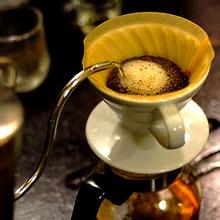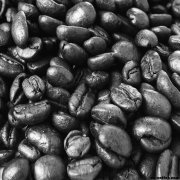The knowledge of coffee bean baking accumulated from practice.
Cup testing is a stepping stone
At Uncle Bean's coffee boutique, Mini games-triangular cup tests-are played every day at 5 p.m., which has become a habit for shop assistants.
Cup testing is first and foremost the basis for bargaining between roasters and raw bean traders. Every year, Uncle Bean will proofread the raw beans with the raw bean traders once, on the one hand, avoid the raw bean traders 'self-boast, on the other hand, also tell each other the basis of their purchase price, so that both parties keep consistent understanding of the flavor of the beans. Cup testing is crucial for bakers,"cup testing ability, equivalent to speaking literacy and singing spectrum." If we only rely on other people's one-sentence teaching, but do not have their own sensory judgment ability, when purchasing raw beans will always be passive, directly bring economic losses, some roasters can not buy coffee beans with high cost performance, the fundamental reason is the lack of cup testing ability."
Second, cupping ability was strongly correlated with coffee roasting results. "When I first started as an apprentice, for ten months, the master asked me to bake the same kind of beans every day, and every time he would ask: What do you want to bake? I was resistant at first,
I thought to myself, you want me to bake this Brazil, and I'll fry it. But then I started to think about what he wanted, and gradually I started to be able to describe in more detail what I wanted from my baked beans, for example: I wanted to bake beans with a higher body and a softer acidity. It's like a sailor, every turn has a precise value. Having the ability to test the cup did not mean that the taste of the taste became more sophisticated. One person could taste three kinds of the same bean, but another person could taste eight kinds. The significance of the cup test training was to recognize and judge the taste of coffee. To know the taste, it had to be tasted repeatedly, just like copying a new word ten times. The first thing you need to do to get into the baking business is to learn how to cup."
"I didn't have professional baking training myself, all my expertise was accumulated through apprenticeship in a baking workshop. Now the market for education and cultivation is mixed. I don't know whether it can be improved through training. I prefer to learn through practice. Don't touch roasting easily. It's not as simple as you think. If you want to learn roasting, start with the cup test, pay attention to the coffee beans themselves, and understand the relationship between the physical state and flavor presentation before and after roasting."
With a rigorous attitude,"mixed rice" adheres to stable production
When asked why Uncle Bean chose coffee roasting, he said, for nothing else, to feed his family. "I was originally engaged in the trade of green coffee beans. At that time, I knew nothing about coffee at all. I visited the place of origin completely from a commercial point of view to judge whether the price of green beans was reasonable or not and whether I could reach a purchase agreement. Later, I came out of the trading company and worked as an apprentice in a baking factory in Europe. After all these years, I knew this and did this."
Now, when you walk into a coffee plantation, the unique natural conditions of the local area, the main cultivated varieties selected in the garden, the processing methods of coffee beans, and the business model of the plantation are all included in the scope of Uncle Bean's examination of coffee beans."There must be a reason for a plantation to choose its main cultivated varieties, whether it adapts to the local natural conditions, and what kind of flavor characteristics can natural conditions give to the varieties. Whether there are major pests in the planting history needs to be carefully considered when purchasing raw beans."
After buying raw beans, Uncle Bean will regularly check the temperature and humidity of the raw bean storage room. The span of storage time, small changes in warehouse temperature and humidity will affect the physical state of beans and directly determine the quality of roasted coffee beans. Each time he prepares for baking, Uncle Bean also adjusts the baking curve of the day accordingly according to the measured values of the day of raw beans.
Baking is the same as clothing design, paying attention to the relationship between structure and style. Green beans can only be tasted by roasting, so roasting is not creating, but revealing. The method of revealing is different, and the taste formed is also different. But after the taste is formed, there is still structure and relationship. For example, a bean acid, bitter, sweet relationship, how to present acid, is to make it very bright or soft point. In addition, how to replicate the taste after it is presented, whether it can detect changes in room temperature, storage time, water content, and fire strength, and make adjustments according to the changes. This is the philosophy that all coffee roasters should embrace-consistent production. Ensure that each batch of coffee beans from the same product has the same quality, which is the result of long tempering and cultivation. Every cup of coffee, from the selection of green beans to the setting of roasting curves, requires strict quality control at every stage.

Changes in China's baking market
In 2001, when Doushu first entered the business, Chinese bakers were mainly concentrated in three places: one was in Guangzhou Economic Development Zone represented by Dongguan and Shenzhen, where bakers were small in scale, large in number, low in threshold, and most of the machines used were made in Taiwan or domestic imitation of Taiwan. At that time, raw beans were processed into mature beans and sold to middlemen or directly to hotels and coffee shops. The second is the Yangtze River Delta centered on Shanghai, which is mainly dominated by Taiwan-funded or domestic enterprises. Due to operating costs, the scale is much larger than that of small factories in Dongguan, and most of the equipment is imported. In addition, Beijing at that time could also be regarded as a center. There were not many bakers, and most of them adopted direct sales.
"The current baking market still maintains the general pattern before. With the upgrading of machinery and equipment and the accumulation of experience of employees, bakers not only improve their production capacity, but also move towards specialization. Most roasters used to know nothing but how much raw beans cost and what color they fry. They didn't drink coffee themselves. Now, even the most earthy bakeries have cup-measuring tables and grades to evaluate the quality of beans. When I first started, there were only a hundred bakers. Now there are probably three or four thousand bakers." Uncle Bean introduced.
Before specialty coffee, the boundaries between growing coffee, roasting coffee, and making coffee in the coffee chain were clear: the plantation placed the green beans at the merchant's boat, the merchant carried the green beans to the roaster's stove, and the roaster placed the coffee at the barista's bar. Now, this boundary is no longer very clear. As a barista, you can also roast coffee beans. Roasters can also directly participate in the purchase of raw beans. If you have your own ideas about the plantation, you can also participate in the operation of the plantation. The unclear boundary of the whole environment also allows more people to participate in the baking market. The reason why this situation is formed is precisely because of the lack of understanding of baking and the disregard for baking technology. "Why do people who have been trained as baristas for two days in China dare to open a coffee shop, but people who have learned to slice noodles for two days dare not open a noodle shop?" Because the evaluation system for sliced noodles is more mature, customers will know if you are authentic as soon as they eat it. As for coffee, no one knows whether you are good or not. At present, there is no authoritative evaluation system and quantitative standards in China."
Slow customer growth
In 2009, Uncle Bean's independent coffee roasting workshop was located in Lize Bridge, West Third Ring Road, Beijing, where you can experience the whole process from raw beans to a cup of coffee. During the two years from March 2010 to March 2012, the store of nearly 350 square meters had few customers and its operating conditions exceeded its expenses. At that time, the coffee market, chain coffee shops were popular, consumers 'awareness of the concept of fine coffee was quite low, let alone coffee beans. In order to reverse the business dilemma, Uncle Bean launched coffee experience classes as low as 10 yuan on group buying websites. These courses took two hours to tell customers how coffee beans were roasted, how to make a cup of coffee and how to taste them. It was the popularization of these basic knowledge that slowly attracted some stable customers.
"In more than four years, the number of people participating in group buying courses has reached 50,000, but these people are not real consumer groups." It's not an exaggeration to say that there are people of all ages who come to the experience class. Most of them are here to watch the fun. Some people never even drink coffee. The reason for coming is very simple: it's not expensive and they can listen to music." In 2010, the sales of Doushu Taobao Store in a week were only 300 yuan most of the time, but now, Taobao store level has reached two crowns, and settled in Tmall. However, out of the 50,000 people who participated in the course, only about a thousand customers may have truly formed buying habits.
"From my entry to now, the coffee drinking group has basically not changed too much, and the business has not seen a significant turnaround at a certain stage. It's just that I've been in this business for a long time, so I feel this slow growth trend. However, I can say for sure that the future development trend of the coffee market will be very good, and the whole industry will grow steadily and rapidly, but it is not clear who will get a share of the market growth." Uncle Bean added with a smile.
Important Notice :
前街咖啡 FrontStreet Coffee has moved to new addredd:
FrontStreet Coffee Address: 315,Donghua East Road,GuangZhou
Tel:020 38364473
- Prev

Coffee beans are born with flavor or are they baked?
Sometimes, you will see a lot of marks on the coffee bean cup score table that have not been paid attention to before, such as almond pie, dried currants, green peaches or cream. So, which of these unique flavors are born with coffee beans and which are roasted? Cream. So, which of these unique flavors are born with coffee beans and which are
- Next

Coffee roasting curve Coffee roast curve
In coffee roasting, the baking curve is a technical term, recording changes in the roasting process of visual icon data, through the thermometer and computer link, the connection between them is: coffee roaster-thermometer-computer (software recommended Artisan). A good coffee roaster such as Probat has a matching display screen and curve software, without external connection. Know before baking
Related
- Beginners will see the "Coffee pull flower" guide!
- What is the difference between ice blog purified milk and ordinary milk coffee?
- Why is the Philippines the largest producer of crops in Liberia?
- For coffee extraction, should the fine powder be retained?
- How does extracted espresso fill pressed powder? How much strength does it take to press the powder?
- How to make jasmine cold extract coffee? Is the jasmine + latte good?
- Will this little toy really make the coffee taste better? How does Lily Drip affect coffee extraction?
- Will the action of slapping the filter cup also affect coffee extraction?
- What's the difference between powder-to-water ratio and powder-to-liquid ratio?
- What is the Ethiopian local species? What does it have to do with Heirloom native species?

